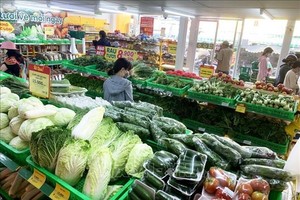 Workers of Minh Man Printing Trading Production Company in Tan Binh Industrial Park tighten the prevention of Covid-19 pandemic. (Photo: SGGP)
Workers of Minh Man Printing Trading Production Company in Tan Binh Industrial Park tighten the prevention of Covid-19 pandemic. (Photo: SGGP)
Many concerns
Mr. Nguyen Van Be, Chairman of the Hepza Business Association (HBA), said that the most complicated situation was in Tan Thuan EPZ when 29 out of 250 enterprises had to close. Some enterprises with tens of thousands of workers in Linh Trung 1 EPZ also had to cease operations. PouYuen Vietnam Company in Binh Tan District has also let 56,000 workers temporarily stop working to handle the pandemic.
Due to the fear that export orders will be late, many enterprises have been negotiating with their partners to delay the delivery time due to a force majeure event. At the same time, enterprises proposed that instead of closing the entire factory, only the workshops with F0 workers should be closed to zone and isolate the F1 cases quickly.
However, Mr. Pham Thanh Truc, Deputy Manager of the Hepza, said that it would lead to greater risks for all enterprises operating in EPZs, IPs, and the SHTP. In fact, workers not only move in the workshops but there are also times they gather. Not to mention that many manufacturing factories use central air conditioning systems, making the disease easy to spread everywhere if there is an F0 case. Therefore, it is necessary to zone a large area in the entire factory, narrow down to each workshop, and suppress the pandemic.
Sharing the same view, Mr. Nguyen Van Be said that the temporary closure of enterprises for quick testing in order to zone and suppress the Covid-19 pandemic might cause certain disruptions in production activities. However, if these disruptions were said to break the global supply chain, it is not entirely accurate. Because the pandemic has appeared for more than 18 months, most of the global supply chains, in general, and Vietnamese enterprises, in particular, have had backup plans so far, for example, increasing inventory so as not to interrupt production. In many signed contracts, enterprises even had changed the on-time delivery term to delivery with prevention of risky situations and allowed late delivery.
Mr. Nguyen Van Be, Chairman of the Hepza Business Association (HBA), said that the most complicated situation was in Tan Thuan EPZ when 29 out of 250 enterprises had to close. Some enterprises with tens of thousands of workers in Linh Trung 1 EPZ also had to cease operations. PouYuen Vietnam Company in Binh Tan District has also let 56,000 workers temporarily stop working to handle the pandemic.
Due to the fear that export orders will be late, many enterprises have been negotiating with their partners to delay the delivery time due to a force majeure event. At the same time, enterprises proposed that instead of closing the entire factory, only the workshops with F0 workers should be closed to zone and isolate the F1 cases quickly.
However, Mr. Pham Thanh Truc, Deputy Manager of the Hepza, said that it would lead to greater risks for all enterprises operating in EPZs, IPs, and the SHTP. In fact, workers not only move in the workshops but there are also times they gather. Not to mention that many manufacturing factories use central air conditioning systems, making the disease easy to spread everywhere if there is an F0 case. Therefore, it is necessary to zone a large area in the entire factory, narrow down to each workshop, and suppress the pandemic.
Sharing the same view, Mr. Nguyen Van Be said that the temporary closure of enterprises for quick testing in order to zone and suppress the Covid-19 pandemic might cause certain disruptions in production activities. However, if these disruptions were said to break the global supply chain, it is not entirely accurate. Because the pandemic has appeared for more than 18 months, most of the global supply chains, in general, and Vietnamese enterprises, in particular, have had backup plans so far, for example, increasing inventory so as not to interrupt production. In many signed contracts, enterprises even had changed the on-time delivery term to delivery with prevention of risky situations and allowed late delivery.
 Enterprises must adopt many synchronous solutions to proactively prevent the pandemic to ensure production stability. (Photo: SGGP)
Enterprises must adopt many synchronous solutions to proactively prevent the pandemic to ensure production stability. (Photo: SGGP)
Sacrificing short-term profits The complete closure of enterprises is a force majeure event that must be accepted to maintain the game for all the remaining enterprises. Statistics from foreign business associations show that HCMC has about 500 out of 1,500 enterprises participating in the global supply chains. Since the Covid-19 pandemic entered Vietnam in early 2020, the Government, agencies, and localities have implemented well solutions to prevent and stamp out the pandemic and maintain production stability. It also explains why despite the complicated development of the pandemic globally, export orders remain abundant in Vietnam. In 2020 and the first quarter of 2021, before the Delta variant appeared, Vietnam's economic growth still maintained at 3-5 percent, and export turnover still kept positive growth. In the first six months of 2021, export turnover of goods was estimated at US$157.63 billion, up 28.4 percent year-on-year. Therefore, in the coming time, to ensure production stability, Mr. Nguyen Van Be said that each factory must apply many synchronous solutions to proactively prevent the pandemic, such as distancing workers in the production lines and using ventilation fans instead of central air conditioning systems. Enterprises arrange and expand accommodation for workers to stay and work. In case there is no accommodation, enterprises should carry out the live-in model, letting their workers sleep and work, all in one place. In districts with many boarding houses near production areas, enterprises should cooperate with landlords to facilitate workers to rent near the factories, convenient for traveling and preventing the spread of disease from outside to the factories.
























